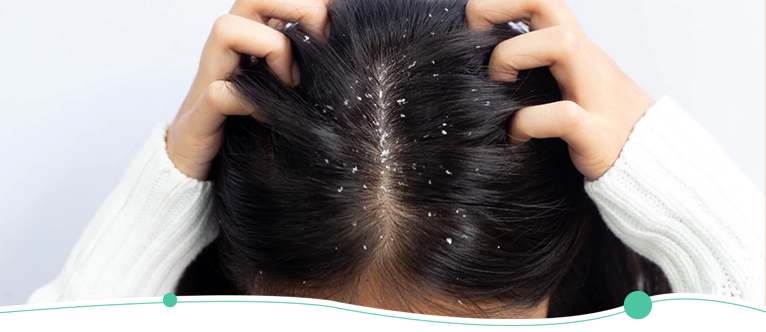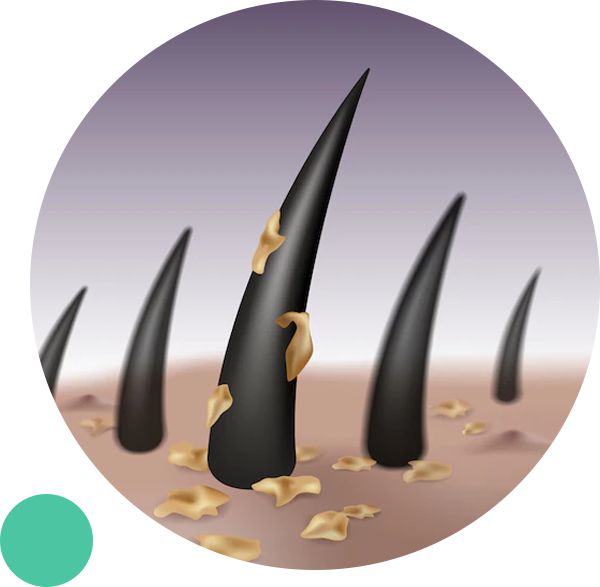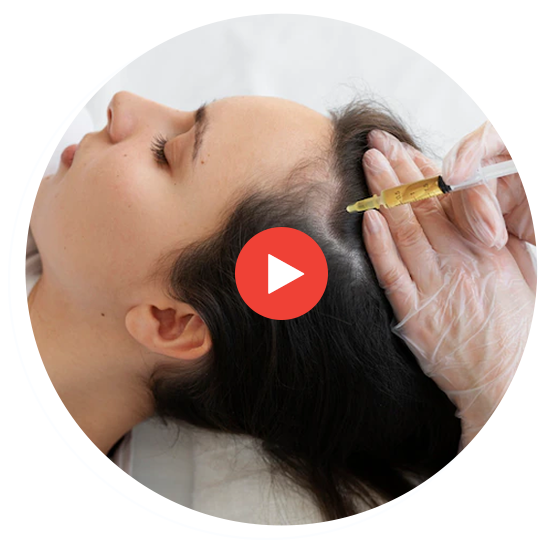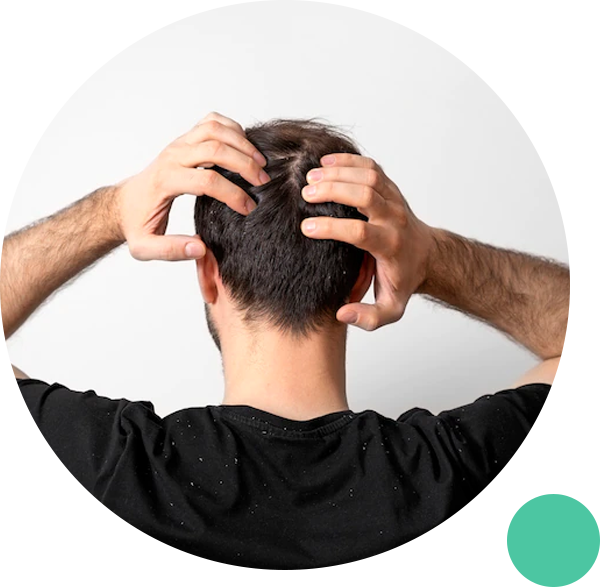

TELMDCARE
What is Dandruff?
Are you worried about dandruff? If so, you're not alone. According to the American Academy of
Dermatology, dandruff is one of the most common skin conditions in the United States today and
affects approximately 50 million Americans.
Dandruff is a common term used to describe flaky and itching skin on the scalp caused by excess
oils and dead skin cells. Other reasons might include dry scalp, heredity, medication, or poor
diet.
Dandruff can be painful and embarrassing, but you should never let it get the best of you.
Let's start by understanding the common causes of an itchy scalp and how an online doctor for
dandruff can help you get rid of it and prevent it in the future.
Book an Appointment for Only
TELMDCARE
Is covered by many popular
insurance plans

TELMDCARE
Symptoms of Dandruff
The symptoms of dandruff can vary from person to person. The most common symptom is a flaky, white buildup of dead skin on the scalp. In addition, individuals with dandruff may experience itching and irritation in the affected areas.
While the symptoms of dandruff are usually non-specific, they can include:
If you notice any symptoms of dandruff, it's important to get dandruff treatment online from a virtual doctor at TelMDCarebefore it becomes more severe.
Causes of Dandruff
The most common cause of dandruff is a dry scalp. The skin on your scalp produces an oil called sebum that helps to keep your hair healthy and shiny. However, when there's not enough sebum present, dead skin cells begin to stick together, forming flakes that trap moisture underneath them, making it easier for bacteria to flourish. This can lead to flaking and itching, two major dandruff symptoms.
Also, if your dandruff is chronic (present for three weeks or longer), it's likely accompanied by another condition such as seborrheic dermatitis or psoriasis. Those conditions are typically caused by medications and cosmetics – not sebum production.
Thus, other causes of dandruff include:
A yeast infection or an allergic reaction:
This may be caused by a fungus or an allergy to something in harsh shampoos or conditioners, excessive heat styling, and tight ponytails.
Psoriasis:
Psoriasis is an autoimmune disease that can cause red patches on your scalp that itch and bleed easily. It can also affect your nails as well as other areas of skin on your body, such as the knees or elbows. You may also see small scaly patches on or around your nose or ears if you have psoriasis on those areas of skin too.
Seborrheic dermatitis:
Seborrheic dermatitis is a common skin condition that causes oily, red patches of skin to form on the scalp and face. The cause of seborrheic dermatitis is thought to be a combination of food allergies and environmental factors. Some foods that may trigger seborrheic dermatitis include chocolate, nuts, dairy products, eggs, and citrus fruits. Seborrheic dermatitis can be further classified as mild or severe. Severe seborrheic dermatitis is more likely to occur in people who have sensitive skin or are prone to developing rashes. Severe cases of seborrheic dermatitis may also develop in children with weak immune systems and adults if they have sensitive skin or a family history of the disorder.
Excessive sebum production:
Dandruff is commonly thought to be caused by an imbalance in skin oils called sebum. Sebum is produced by glands under the skin and helps protect the scalp from dust and bacteria. The most common cause of excessive sebum production is a yeast infection (candida). Candida infestation can occur on any part of the body, but it is more common in areas with a lot of hair growth, such as the head or beard area. This type of infection may also occur when you have low immunity due to a health condition such as diabetes or thyroid problems. Thus, when there is an excess amount of sebum on the scalp, it can cause dandruff.
Hormonal changes:
Menopause, pregnancy, and hormonal birth control can increase the number of scalp flakes.
Risk Factors Associated
With Dandruff
Genetics: Dandruff is a hereditary condition that can be passed on to your children if you have it.
Does Dandruff Cause Headaches?
Dandruff can cause headaches in people with sensitive skin. If your scalp is irritated or red, dandruff may be the culprit.
TELMDCARE
What causes an oily scalp?
An oily scalp occurs when there are too many sebaceous glands present on the scalp. This can cause excess sebum production and blockage of pores, leading to acne-like breakouts on the forehead and face. Oily hair needs regular shampooing to keep it clean and prevent clogged pores from forming.

TELMDCARE
As Seen On


TELMEDCARE
What we treat
We treat a variety of acute and chronic conditions and provide expert medical advice and guidance for our patients.
Read More
TELMDCARE
Treatment For Dandruff
Dandruff can be treated with an over-the-counter solution or medicated shampoo, but this is often not enough to deal with the underlying cause.
Thus, the most effective treatment for dandruff is to address the cause of the condition. If a bacterial or fungal infection is the cause, then a prescription medicine from an online doctor for dandruff at TelMDCare can help treat the symptoms.
In cases where a flaky, itchy scalp is caused by dry skin and overactive sebaceous glands, use a moisturizer or emollient to restore moisture to the hair shafts. Similarly, try shampooing your hair alternatively using an anti-dandruff shampoo. This’ll help remove dead skin cells on your scalp and prevent dandruff from returning. If you want to keep dandruff at bay, using a shampoo containing ingredients like tea tree oil, sage, or rosemary can help. These oils have anti-fungal properties that can help keep the problem under control.

Medication services available 24/7 for adults and kids (3+)
Top quality, board-certified doctors
No insurance needed
Same-day prescriptions available*
*Prescriptions provided at doctor’s discretion.

TELMDCARE
Why Choose Us?
If dandruff is caused by a fungal infection such as pityrosporum folliculitis (tinea barbae), our online doctor for dandruff may recommend topical anti-fungal medications. Oral antifungals such as ketoconazole and itraconazole are also effective in treating pityrosporum folliculitis. These drugs work by stopping yeast from growing in the scalp and destroying its cell walls so it won’t reproduce and cause itching and irritation. You can also use oral antibiotics to treat bacterial infections. However, you should only take these medicines if your online doctor for dandruff prescribes them for you.
If you have dry skin and often wake up with flakes in your hair or on your pillowcase, you may want to consider using a dry shampoo before washing your hair with shampoo again so that your scalp gets better relief from dryness.
Hair Loss Treatment Options
Laser treatment
Medications come in many forms, but they all work in a similar way to stimulate hair growth or prevent further hair loss. Different medications can be used for different types of hair loss, including androgenetic alopecia (pattern balding), telogen effluvium (acute shedding), and traction alopecia (pulling at the scalp).
In this type of medication, you take a pill once or twice a day for several months. It's called finasteride or dutasteride. It’s also available as a generic drug called Propecia or Proscar. These drugs work by lowering levels of estrogen in your body, which causes your hair follicles to shrink back down into the skin where they should be — not on top of it like they normally would be during the normal growth phase of your hair’s cycle.
If you have been experiencing symptoms such as thinning hair, frequent shedding, and/or irritation from dryness and itching, an online doctor for hair loss may recommend this type of medication.
Laser Therapy
Laser therapy is one of the most popular hair loss treatment options. It uses low-level laser energy to stimulate the growth of new hair follicles.
Laser therapy is effective because it targets both hair loss and baldness at once. Laser therapy can be used in conjunction with medications or other treatments to help improve your chances of regrowth.
Hair Transplant Surgery
Hair transplant surgery is a procedure that involves removing hair from the back and sides of the head and placing it on areas where there is a bald spot. The hair is then transplanted into the balding area.
Hair transplant surgery can be performed to treat various types of hair loss, including pattern hair loss, alopecia areata, and autoimmune alopecia. The procedure can also be used with other treatments for male pattern baldness, such as minoxidil or finasteride.
There are two types of surgical procedures used in hair transplantation: follicular unit extraction (FUE) and strip harvesting. In FUE, individual follicles are removed from the back of the head, while strip harvesting removes a strip of skin grafts from each side of the scalp.

Get Affordable and Reliable Treatment
For Dandruff Online At TelMDCare
TelMDCare is one of the most reliable online platforms for health care that provides affordable and reliable treatment for skin diseases, including dandruff, acne, and eczema. Our clinic also offers treatment for other common skin conditions like psoriasis, rosacea, and more.
Our team of qualified internal medicine and family doctors provides quality treatment for dandruff online, starting at just $43.
Signup to schedule an appointment with our general physicians. We also provide online chat alternatives and free follow-up services without making you wait.
Get in touch with us for online treatment for dandruff.
TELMDCARE
Sign Up
Our best online doctors on call ensure that the services we provide are adequate, high quality,
and affordable.
Get in touch with us today for more details or Sign Up for a quick consultation.
$43 SIGN UP
TELMDCARE
FAQs For Dandruff
Dandruff can occur due to many different reasons. Some people may have dry or itchy scalps; others may have oily scalps or be prone to excessive facial hair growth. People with sensitive scalps may develop severe dandruff if they're allergic to a specific ingredient in their shampoo or conditioner, such as cetylpyridinium chloride (CPC). For example, some men are allergic to their natural oils when they develop severe dandruff because of an overproduction of sebum.
No, dandruff is not contagious. But if you have very oily hair dyed darker than your natural color, you may be more likely to get itchy symptoms from other people who are also dealing with dry skin on their scalps.
A dry scalp is usually caused by a low oil content in your diet or low humidity. If you don’t wash your hair often enough, it may become dry and flaky. It can also be caused by seborrheic dermatitis, another common skin condition that causes crusty red patches on the scalp.


